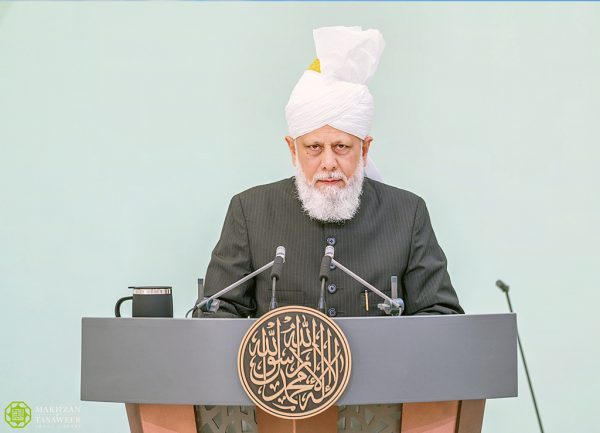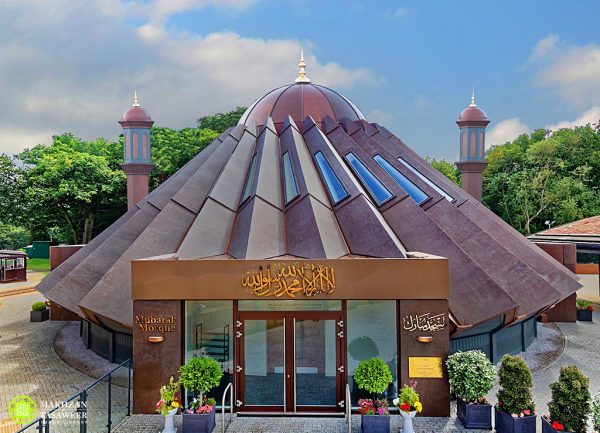
Friday Sermon Summary 8th March 2024: ‘Incidents from the Life of the Holy Prophet (sa) & Guidance in Light of the Harrowing Situation of the Word’
After reciting Tashahhud, Ta‘awwuz and Surah al-Fatihah, His Holiness, Hazrat Mirza Masroor Ahmad (aba) said that there is an incident from the Battle of Uhud in which the Holy Prophet (sa) prayed for the Hazrat Sa’d’s (ra) prayers to be accepted.

Prayers in Battle for Hazrat Sa’d (ra)
His Holiness (aba) said Hazrat Sa’d (ra) had vowed that either he would remove the enemy or that he would be martyred in the battle. In the course of the battle, he saw someone almost being overcome by the enemy, but then he took some stones in his hand and threw them in the enemy’s direction. When Hazrat Sa’d (ra) asked who it was, he was told that it was the Holy Prophet (sa) and that he was calling him. Hazrat Sa’d (ra) then went to the Holy Prophet (sa) who stationed him in front of himself and Hazrat Sa’d (ra) would shoot arrows while praying. ‘O Allah, this is Your arrow, may You strike the enemy with it.’ The Holy Prophet (sa) would pray, ‘O Allah, accept Sa’d’s prayer. O Allah, make Sa’d’s aim accurate. O Sa’d, may my parents be sacrificed for you.’When Hazrat Sa’d (ra) ran out of arrows, the Holy Prophet (sa) gave him his arrows. Among them was an arrow that did not have a point at the front, however, it turned out to be the fastest arrow of all. It is said that on that day, Hazrat Sa’d (ra) shot a thousand arrows.
His Holiness (aba) quoted Hazrat Mirza Bashir Ahmad (ra) who writes,
‘The Holy Prophet (sa) would hand arrows to Sa‘d (ra) himself and Sa‘d (ra) would continue to shower the enemy with arrow upon arrow. At one instance, the Holy Prophet (sa) addressed Sa‘d (ra) saying, “May my mother and father be sacrificed upon you – go on shooting arrows!” Even to the very end of his life, Sa‘d (ra) would recall these words of the Holy Prophet (sa) with great pride.’
(The Life and Character of the Seal of Prophets (sa), Vol. 2, p. 338)
‘Slacken not, Nor Grieve’
His Holiness (aba) said that when Khalid bin Walid led a detachment of the Quraish to the hill that the Holy Prophet (sa) was standing on, the Holy Prophet (sa) prayed, and then Hazrat Umar (ra) also brought a detachment to turn them away. It was after this that God Almighty revealed the Qur’anic verse:
‘Slacken not, nor grieve; and you shall certainly have the upper hand, if you are believers’ (The Holy Qur’an, 3:140)
His Holiness (aba) quoted Hazrat Mirza Bashir Ahmad (aba) who writes:
‘When the Holy Prophet (sa) had arrived at the mountain pass, a contingent of the Quraish headed by Khalid bin Walid attempted to ascend the mountain and wage an attack, but on the command of the Holy Prophet (sa), Ḥazrat ‘Umar (ra) fought them along with a few Muhajirin and drove them off.’
(The Life and Character of the Seal of Prophets (sa), Vol. 2, p. 340)
His Holiness (aba) said that despite being injured himself, the Holy Prophet (sa) was concerned about his companions. It is recorded that Hazrat Talhah (ra) was seen protecting the Holy Prophet (sa) during the course of battle. When Hazrat Abu Bakr (ra) reached the Holy Prophet (sa) he found him to be injured, however, the Holy Prophet (sa) told him to tend to Hazrat Talhah (ra) instead, as he was bleeding profusely.
His Holiness (aba) said that after burying the martyrs, the Holy Prophet (sa) returned from Uhud to Madinah. It is recorded that the Holy Prophet (sa) arrived back to Madinah in time for Maghrib (prayer offered right after sunset). When the Holy Prophet (sa) emerged from his home for the Maghrib prayer, he required assistance in getting to the mosque on account of his injuries and fatigue. However later, when it came time for Isha (night prayer), the Holy Prophet (sa) had rested and was in better condition, thus not requiring any assistance and was able to walk under his own power.
His Holiness (aba) quoted Hazrat Mirza Bashir Ahmad (ra) who writes:
‘After having discharged all relevant engagements, the Holy Prophet (sa) set back to Madinah, as evening drew near.’
(The Life and Character of the Seal of Prophets (sa), Vol 2, p. 348)
His Holiness (aba) said that, in other words, the Holy Prophet (sa) did not leave for Madinah right away on account of being injured, rather he ensured that all necessary tasks were tended to at Uhud before making his way back to Madinah.
Noble Example of the Muslim Women
His Holiness (aba) said that the women of Madinah also displayed great patience and contentment. Upon returning to Madinah, the Holy Prophet (sa) met Hazrat Hamnah (ra), wife of Hazrat Mus’ab bin Umair (ra). She was informed about the martyrdom of her brother Hazrat Abdullah bin Jahsh (ra), and then she was informed about the martyrdom of her uncle. She was very patient and prayed, ‘Surely to Allah we belong and to Him shall we return.’ upon hearing this news. Then she was informed that her husband was also martyred, upon which she could not hold back her tears. Upon this, the Holy Prophet (sa) said that the relationship between a husband and a wife is unlike any other relationship.
His Holiness (aba) that when Hazrat Hind’s (ra) brother, son and husband were martyred in the Battle of Uhud. Hazrat Aishah (ra) had set out to find out news about the Battle of Uhud. She came across Hazrat Hind (ra) who was returning from Uhud. Upon asking her for news, despite three members of her own family having been martyred, she said that the Holy Prophet (sa) was well, and if he was alright, then all else was alright. She then recited the following Qur’anic verse:
And Allah turned back the disbelievers in their rage; they gained no good. And Allah sufficed the believers in their fight. Allah is Powerful, Mighty.’ (The Holy Qur’an 33:26)
His Holiness (aba) said that Hazrat Hind (ra) had been taking the deceased bodies of her family upon her camel towards Madinah. However, the camel would not move when facing Madinah but moved swiftly whilst facing Uhud. She returned to Uhud, met the Holy Prophet (sa), and related this incident to the Holy Prophet (sa). The Holy Prophet (sa) asked whether her husband had made any pledge before the battle, and she responded by saying that he pledged not to return to his people disgraced and he prayed to be martyred in the battle. The Holy Prophet (sa) said that this was the reason the camel was not moving towards Madinah. The Holy Prophet (sa) said that some people who, if they say something whilst swearing by God, then God certainly fulfils it, and Amr bin Jamuh (ra) was among those people. The martyrs of Uhud were then buried at Uhud.
His Holiness (aba) said that he would continue narrating these incidents in the future.

Appeal for Prayers for Palestinians, the Harrowing Situation of the World & Ahmadis in Yemen
His Holiness (aba) urged prayers for Palestinians. May Allah the Almighty create ease for them. As a result of their depraved mentality and actions, the enemy is bent upon destroying them. Rather than trying to stop the war, the major powers are trying to fan its flames. The US President called for a ceasefire last week, and now it is said that a ceasefire will happen before Ramadan, but only as a temporary one for six weeks. All this will do is give Israel time to recoup and then start their cruelties afresh. It is only Allah the Almighty Who can put a stop to them. Hence, we must pray. Through charities, Ahmadis should try to provide them with food, medicine or any sort of aid. In their own areas, they should also raise their voices for bringing an end to these injustices. They should continue writing letters to politicians and not tire in doing so. May Allah the Almighty enable the Palestinians to also increase in their prayers and improve their spiritual states. There is news that Europe and the US will become directly involved in the Russia-Ukraine war and this also increases the threat of a world war. Hence, we must pray in this regard as well; may Allah the Almighty protect the world from destruction. The Fourth Caliph (rh) had prescribed a homeopathic medicine to help protect against atomic effects and everyone should complete a course of this medicine. Ahmadis should also store rations for at least two to three months in their homes. Even if there is no war, storing rations can prove beneficial.
His Holiness (aba) also urged prayers for the Ahmadis of Yemen; may Allah the Almighty swiftly procure the means for their release. There is a Yemeni group which says that Ahmadis are plotting against the government; may Allah the Almighty remove these thoughts from them and may He procure the means for Ahmadis to be released.
His Holiness (aba) prayed that may Allah the Almighty grant the world wisdom, that rather than falling into the evils of the world under the guise of advancement, may they recognise Allah the Almighty. May Allah the Almighty enable Muslim countries to establish justice and become united. May Allah the Almighty enable us to convey His message to every person in the world.
Funeral Prayer of a Martyr in Pakistan
His Holiness (aba) said that there is also some unfortunate news. Respected Tariq Cheema, son of Khizr Hayat Cheema of Pakistan, was recently martyred. Two unknown people opened fire on him, leading to his martyrdom. He was 60 years old at the time of his martyrdom. He had set out for his morning walk when he was martyred. He did not have any enemies or personal grievances with anyone. He was serving as the local president of the community. There can be no reason other than his religious beliefs which led to his martyrdom.
He was regular in offering financial contributions, and was regular in offering prayers with great care. He had a great deal of love for Khilafat. He was very trustworthy, so much so that even non-Ahmadis would leave their valuables with him for safekeeping. His wife attested to his kind treatment of her and always treating her as a friend as well. He was kind to his children and tended to their upbringing in an excellent manner. He was loved by everyone and had a particular passion for serving humanity. He is survived by his wife, two sons and a daughter. His Holiness (aba) prayed that may Allah elevate his station, grant him forgiveness and mercy, grant patience to the family and enable them to carry on the legacy of his virtues.
Summary prepared by The Review of Religions



